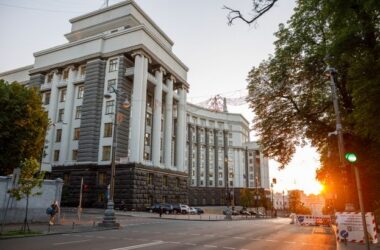The war affected every Ukrainian, so reconstruction affects everyone. The topic of recovery is cross-cutting for all processes in the state, plays a decisive role during the formation of policies and development of strategies. But it is not only about the reproduction of what was destroyed, but about the need to create a more sustainable, barrier-free and successful country.
I suggest you think about what areas you need to focus on for successful reconstruction.
1. A powerful defense-industrial complex
Historically, war has always contributed to the development of new technologies, which we can see even now. Ukrainian state enterprises and private initiatives are already working on dozens of developments, including high-tech ones. An army of drones of various modifications and purposes, robotic land and sea systems, data analysis, the use of artificial intelligence – this is what our defense forces are already working with and this trend will increase.
This area of the economy can become a booster for post-war Ukraine. Instability in the world is increasing, and tested in real battles makes Ukrainian technologies more competitive than analogues. In particular, the Strategy for the Development of the EU Military Industry until 2030 envisages close cooperation with defense enterprises of Ukraine.
Every effective decision saves strength and saves the lives of our defenders. We have no other choice but to become a “fortress state” and the security sphere will play a leading role in ensuring Ukraine’s sovereignty for many decades to come.
2. Strategic vision and planning
This is a key stage that determines all further steps of reconstruction. It is about a clear and detailed plan of systemic reforms that Ukraine needs for development and European integration. The EU approved the Ukraine Facility reform program with a financing package for Ukraine. The program covers all areas: from public administration to energy and industry.
The reconstruction of Ukraine will be based on the principles of “better than it was”, New European Bauhaus, green transition and digital transformation. These principles also determine the direction of reconstruction at the level of regions and communities, including programs of comprehensive recovery. Each affected community and region is developing its own recovery strategies that take into account their unique needs and challenges. Dozens of such documents are being developed at the level of regions and communities. This approach to planning at the national and local levels allows coordination with partners, refining approaches and taking into account actual and potential risks.
3. Sustainable and circular economy
Our key priorities are humanitarian demining, overcoming the consequences of hostilities, modernization and decentralization of energy. Assessment of the ecological situation is an important part of recovery, in particular during the development of comprehensive recovery programs.
But it is necessary to implement the principles of circular economy. More than 100 million tons of rubble and construction waste generated by the war must be sorted and recycled. Attacks on energy infrastructure make the issue of using better technologies and energy efficiency standards a reality. High quality standards for building materials (as required by the European 305 regulation), the rejection of harmful materials, mandatory energy efficiency requirements, an energy efficiency action plan and a decarbonization fund have already been introduced. Ahead is the implementation of these measures in practice.
4. Improvement of the investment climate
Reconstruction of Ukraine will require significant investments, in particular private ones. Real liberalization of the economy with a flexible and transparent tax system is necessary. Currently, the requirements for projects subject to the law on “investments” have been reduced, and the scope of their implementation has been expanded, in particular in the processing industry and waste management. More systematic and large-scale steps are needed.
The government should take even more active measures to fight corruption. A strong and independent legal system guarantees the protection of investors’ rights and the fair resolution of disputes. Ukraine’s leadership in digital transformation will simplify doing business. It is about the development of electronic government services, e-commerce and other digital tools.
5. End-to-end digitization
Many services are already provided in digital format – the majority of Ukrainians have felt the benefits of the “state in a smartphone”. The construction industry, which is key to recovery, is being digitized – thanks to the Unified State Electronic System in the Construction Sector (EDESSB). I believe that, like the defense complex, digitization should become a strong point of Ukraine, which can be offered “for export”, as is already happening with Diya.
But currently, many digital solutions are only at the implementation stage and it is very important that everything is brought to a logical conclusion. The largest digital project in the history of Ukraine – the DREAM ecosystem for reconstruction. It already has its first results, and it is key to financing reconstruction, because it is being developed in cooperation with international partners. A geo-information system for monitoring regional policy, which should work to strengthen the capacity of communities, an urban cadastre, a number of digital solutions for the implementation of local democracy.
6. Strengthening of decentralization and involvement of citizens
Ukraine should continue its course of decentralization. Since the beginning of this year, the parliament has adopted a number of important laws: more transparent work of local self-government bodies (6401), development of international municipal cooperation (9450), improvement of mechanisms of local democracy, in particular electronic petitions, other forms of public participation (7283).
Currently, draft laws on improving the work of self-organization bodies of the population (6319), ensuring legal supervision of local government decisions (4298), Effective formats of public consultations (4254) and others are awaiting the second reading. Legislative changes, institutional support, in particular from international partners, and the introduction of digital tools will contribute to the reconstruction and development of territorial communities, which are the key to a strong Ukraine.
7. New housing policy and social infrastructure
New approaches must address both current challenges caused by war and old ones that have been ignored for decades. The isRecovery program addresses urgent housing issues, but systemic change requires new laws, such as the Basic Principles of Housing Policy, developed with the participation of international partners and the public.
An up-to-date record of housing is necessary, as well as the creation of a state housing fund and funds of territorial communities, which will enable prompt response to housing needs. It is important to develop lending instruments – mortgages, leasing, interest compensation, etc. The draft law envisages the creation of a single digital system that will analyze data about a citizen and offer the best way to meet housing needs.
The approach to urban planning should be comprehensive, data-driven and with a focus on quality social infrastructure. The parliament and the government have already adopted a number of important documents regarding the improvement of construction standards, energy efficiency, inclusiveness, implementation of modern urban planning documentation, etc. Currently, the Committee of State Power, Local Self-Government, Regional Development and Urban Planning is preparing a draft law on the renovation of Khrushchev buildings in order to implement modern standards during the modernization of outdated housing.
8. Barrier-free as a new social norm
Due to the war, the number of people with disabilities, psychological problems such as PTSD and depression is increasing. An important issue is the social, psychological, and economic integration of hundreds of thousands of veterans. The scale of the problems prompts Ukraine to become a leader in barrier-free and inclusiveness. This is an ambitious goal given the low level of inclusive infrastructure, war and other obstacles
Currently, the barrier-free strategy adopted by the government is being implemented, new state building regulations regarding the general inclusion of buildings, and regulations regarding schools, kindergartens, and the improvement of territories have entered into force, and the requirements for fire safety of buildings and evacuation have been strengthened. Digitization, increasing transparency and compliance of processes in the construction industry also contributes to compliance with the necessary standards of barrier-free buildings and infrastructure.
However, barrier-free is not only about equal access to physical objects, but also to services, information, work, education, medicine. Currently, there are a number of useful initiatives to help IDPs, reintegrate veterans, in particular through participation in sports competitions, support of veteran enterprises, etc. But there should be more such steps.
As I have already mentioned, high defense capability and digitization are indispensable for Ukraine. Barrier-free should also be added to this list, as a new end-to-end social norm that should be implemented at the level of the state, local authorities, businesses and ordinary citizens.








